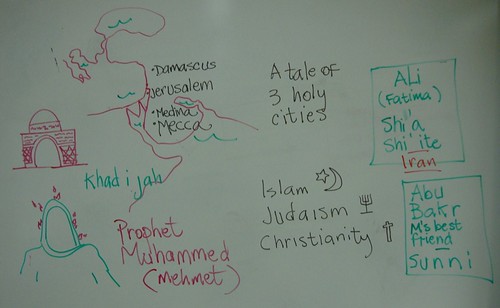Islam - devotion to God, or Al'lah and to the teachings of the Qu'ran.
Muslim - a person who adheres to the teachings of the Qu'ran / Koran.
Mecca - birthplace of the Prophet Muhammed; the holiest city of Islam.
Medina - city in which the prophet lived while in exilke from Mecca. Second holiest city to Sunni Muslims.
Moslem - same as Muslim despite the adjustment in spelling.
Jerusalem - third holiest city of Islam. Jeruslem is holy to 3 religions: Judaism, Christianity and Islam. Thus Fri, Sat and Sun are each sabbaths in the city of Jerusalem.
Khadija, a widow fifteen years Muhammad's senior, later proposed marriage to him, which he agreed to. They lived together for almost a quarter of a century, says quaranicstudies.com, until the death of Khadija - about 8-9 years after the revelation of the Qur'an. Muhammad did not get married to any other woman during Khadija's life, despite the fact that polygamy was common practice in that society.
It was in a desert cave in 610 CE, i.e. at the age of forty, that Prophet Muhammad received from Allah the first verses of the Qur'an. The verses were delivered by the Archangel Gabriel. The Qur'an continued to be revealed in fragments to Prophet Muhammad over the following twenty two years. The last words of the Book were revealed to the Prophet shortly before his death in 632 CE.
Alī ibn Abī Ṭālib: Ali was also the cousin and son-in-law of the Islamic prophet Muhammad, and ruled over the Islamic Caliphate from 656 to 661,[5] and was the first male convert to Islam.[6][7] Sunni Muslims consider Ali the fourth and final of the Rashidun (rightly guided Caliphs), while Shia Muslims regard Ali as the first Imam and consider him and his descendants the rightful successors to Muhammad, all of which are members of the Ahl al-Bayt, the household of Muhammad. This disagreement split the Ummah (Muslim community) into the Sunni and Shia branches.[1]
Abu Bakr was a senior companion and the father-in-law of the Islamic prophet Muhammad. He became the first Muslim Caliph following Muhammad's death.[1] As Caliph, Abu Bakr succeeded to the political and administrative functions previously exercised by the Prophet, since the religious function and authority of prophethood ended with Muhammad's death according to Islam. He was called Al-Siddiq (The Truthful)[2] and was known by that title among later generations of Muslims.
Indie work -
Brief comparison essay on the biographies of Jesus of Nazareth and the Prophet Muhammed.
Quiz each class on movie notes. See questions below.
skip to main |
skip to sidebar
For students and parents who love education and exploration of the social sciences . . .
Search This Blog
Followers
Blog Archive
-
▼
2012
(254)
-
▼
February
(28)
- East Africa and its close relationship to Arabia
- Cut paper project on the Rift Valley of Africa
- From the Mediterranean to the Arabian Sea quiz
- East of the Mediterranean quiz
- A city of 3 religions: the ancient city of Jerusalem
- Separatists by culture: Jews in Europe in the Medi...
- "Peace the old fashioned way" vs diplomatic force
- Quiz on the nations in the region of the Persian Gulf
- The ancient and perhaps insoluble conflict between...
- Paper project: Masjid al-Haram or the Grand Mosque...
- Mecca's (Mekkah) Grand Mosque / quiz next class
- From Oxfordshire to Mecca / Lawrence of Arabia quiz
- Prince Feisal (later, King Feisal) quiz
- The Blasphemy quiz and the Suez Canal
- Islam: the origin of the rift between the Sunni an...
- The Wadi quiz
- The classic elements of a mosque interior
- 5 Pillars of Islam project due next class / 10 pts...
- Prince Feisal quiz / Lawrence unit
- In Arabia: the Life of the prophet
- Make a joyous, high-pitched, warbling sound: ulula...
- Southwest Asia, the home of coffee
- TE Lawrence and the Turks and Arabs
- Arabian Horse: handsome, speedy, tough and expensive
- Lawrence of Arabia quiz: From Oxfordshire to Mecca
- Brief quiz each class during "Lawrence of Arabia"&...
- Saudi Arabia and the story of Lawrence of Arabia
- Lawrence of Arabia and a study of the Mid East
-
▼
February
(28)

